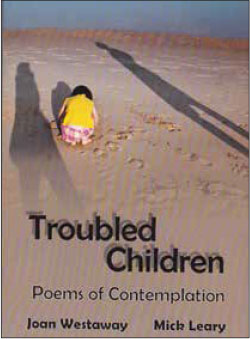Serviços Personalizados
Artigo
Indicadores
Links relacionados
-
 Citado por Google
Citado por Google -
 Similares em Google
Similares em Google
Compartilhar
SAMJ: South African Medical Journal
versão On-line ISSN 2078-5135
versão impressa ISSN 0256-9574
SAMJ, S. Afr. med. j. vol.105 no.1 Pretoria Jan. 2015
BOOK REVIEWS
Troubled Children - Poems of Contemplation

By Joan Westaway and Mick Leary.
Alloa, Scotland: Diadem Books, 2014.
ISBN 978-1-291-95246-9
'How many times have I stood with my ear to your shell listening for an echo...'
The American author Joan Didion once commented that she writes to discover what she thinks and feels. We all possess a creative capacity that can help us to expand our understanding of our inner and outer worlds. Insight into who we are and what drives us helps us to be more effective in all areas of our lives.
Medicine is particularly challenging, in that practitioners are up close and personal with the difficulties of mind, body and spirit. We are affected by our patients, even though we might try to detach by donning the white coat of technical expertise and scientific fact. Too often we tuck our feelings away to cope with a demanding job.
Joan Westaway is an experienced child psychiatrist who turned to the pen to explore her observations. Her poems often have the quality of a debriefing, as she lets loose the frustrations, heartaches and pleasures of working with children and adolescents who are emotionally troubled or do not fit in with society's expectations of 'normal'.
'In my mirror we are trapped; the attacker and the attacked, like two cobras interlocked and trading venom in a windowless prison -'
Some poems are from the perspective of the patient, others from that of the therapist. Joan does not stay on the surface of the matter, but immerses herself and the reader in the world of the disturbed. Her poems are occasionally hard to understand, as she mirrors and is pulled by the emotions of her patients.
I thought this could be a weakness, but later saw it as a strength. The reader is confronted with confusion, not unlike that which the psychiatrist initially encounters when working with patients. Each poem is then contextualised by Joan's colleague Mick Leary, a paediatric neurologist.
Through her brave, thoughtful writing, Joan challenges us to be honest about our responses, to develop a critical attitude to ways in which medical practice falls short of the goal to heal, and to grow empathy with our patients.
'See these sockets, they were my eyes; now they are dongas, the waterholes of flies -'
Dawn Garisch
Author of Eloquent Body (Modjaji, 2012) and Dance With Suitcase (Tiber Tree Press, 2013), Cape Town, South Africa.
dawn.garisch@gmail.com














